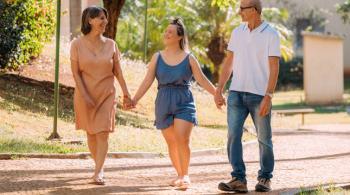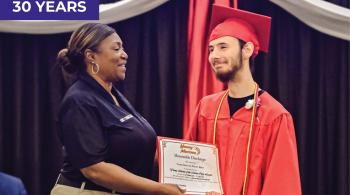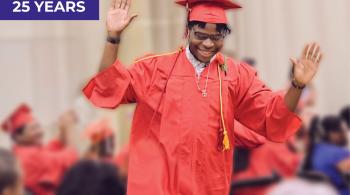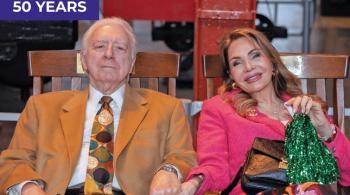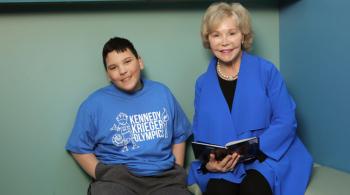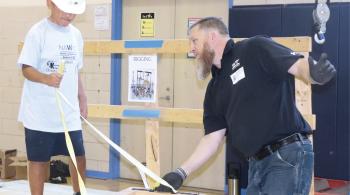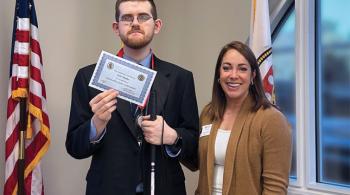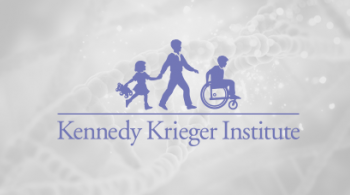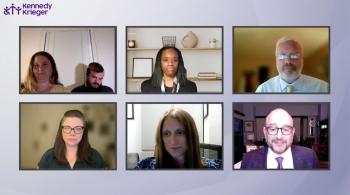The Transition Planning Process for Individuals With an IEP
On this month's episode of Your Child's Brain, we discuss the transition planning process for individuals with an IEP.
Speakers for this month include:
- Stacey Herman, assistant vice president, Neurodiversity and Community Workforce Development .
- Hannah Wayne, principal at the Kennedy Krieger Powder Mill School Program
- Maureen van Stone, director of Maryland Center for Development Disabilities
founding director of Project HEAL (Health, Education, Advocacy, and Law) at Kennedy Krieger Institute
associate, Department of Mental Health, the Johns Hopkins Bloomberg School of Public Health
Resources discussed in this month's episode:
- Maryland Developmental Disabilities Administration
- Maryland State Department of Education Division of Rehabilitation Services
- US Dept of Labor Office of Disability Employment Policy
- Kennedy Krieger Resource Finder
View Episode Transcription
Brad Schlaggar (BS): Welcome to Your Child's Brain, a podcast series produced by Kennedy Krieger Institute with assistance from WYPR. I'm Dr. Brad Schlaggar, Pediatric Neurologist and President and CEO of Kennedy Krieger Institute. Today we will be discussing a complex topic of transition into adulthood, individuals living with intellectual and or developmental disabilities. In this episode, we will be focusing primarily on transitions related to education and employment. Joining me today for this discussion will be three of my Kennedy Krieger colleagues who are true experts in this space. They are Stacey Herman, Assistant Vice President for Neurodiversity and Community Workforce Development at Kennedy Krieger. Hannah Wayne, Principal at Kennedy Krieger's Powder Mill Middle School Program in Beltsville, Maryland. Maureen van Stone, Director of the Maryland Center for Developmental Disabilities and founding Director of Project HEAL, that's Health, education, Efficacy, and Law at Kennedy Krieger Institute, and an associate in the Department of Mental Health at the Johns Hopkins Bloomberg School of Public Health. Welcome Stacey, Hannah and Maureen. Maureen let's start with you and let's define what we mean by transitions and then let's get into what is transition planning for individuals with disabilities.
Maureen van Stone (MVS): Sure, Thanks, Brad. Transition planning is a process that is mandated by the Individuals with Disabilities Education Act or IDEA for all students who qualify for an individualized education program in the K to 12 educational space. The purpose is really to facilitate the students move from school to post-school activities. Transition planning for adolescents and young adults with disabilities must start before the student turns 16 under federal law. However, here in Maryland, transition planning begins at the age of 14. It must be individualized and based on the student's strengths, preferences, and interests and opportunities to develop functional skills and work in community life.
BS: Well, thanks, Maureen. Hannah.
Hannah Wayne (HW): Transition plans are a part of every individual education plan, and in the state of Maryland, they begin the calendar year the adolescent with a disability turns 14 years old. Every transition plan is student-centered and they should include student and staff input, annual vocational, independent living and leisure assessments, as well as parent or guardian feedback. Student feedback again, is most important, or should be most important. It is essential to capture and describe each child's strengths and needs annually in order plan accordingly for life after school.
BS: Stacey, maybe a couple of comments about the adulthood adult services part of the equation.
Stacey Herman (SH): As we think about adult services and transitioning from school to adulthood, we want to think about the different pathways that a young adult with disabilities can take. That could be looking at college education. It could be transitioning to adult service agency if they are eligible for services through the Developmental Disabilities Administration, it could be employment, it could be housing and living supports, and of course, leisure. We want to look at a full and meaningful life when it comes to transitioning from school to adulthood, and that takes a large group of stakeholders and a team to come together to support that person into that transition.
BS: Thanks, Stacey. The next question is, maybe we could talk more about the different opportunities that students have who receive special education and then related services and how they're different from traditional or mainstream classroom settings. Hannah maybe take that one.
HW: Sure. There are definitely benefits of both or certificate of completion as well as a diploma for individuals with disabilities. With regard to the certificate of completion. With this option, there can be an emphasis on daily living skills. With regard to earning a diploma, individuals with special needs who work towards earning a diploma are required to earn a specific number of credits. They need to meet attendance requirements and complete all of the standard statewide assessments. Again, with a diploma, students can go on to college programs and receive accommodations in their college programs as well.
BS: Thanks very much, Hannah, this issue of eligibility for accommodations and versus entitlement Maureen maybe take us through how to think through this issue, entitlement versus eligibility.
MVS: Yeah, absolutely. Thanks, Brad. For adolescents and young adults with disabilities who qualify for special education related services. Their transition planning will include post-secondary goals or outcomes for that individual student, and that might include employment. It will include education or training and independent living, and as the student is working towards achieving those post-secondary goals or outcomes they are entitled to receive services through their IEP while they're in school. When they transition from school to post secondary opportunities, they are then leaving the entitlement system and they are in the world of eligibility. That particular student will apply for adult services and supports, and will link to agencies, adult agencies through the IEP process. But it really will be a shift for that individual, student and that family from entitlement to eligibility.
BS: Stacey we can pick up from there, the eligibility process as you get into adulthood and for adult services, maybe talk a bit about that process.
SH: Yeah, when families and individuals with disabilities are looking to receive an access services through the Developmental Disabilities Administration or through the Division of Rehabilitation Services, they go through an application process. They need to be determined eligible for services, which means that they have access to funding for support or employment, living and accessing their community. What's really special about Maryland is that they actually have what's called a priority category. When a young adult is graduating from school around June time, they actually have one year to come off the Developmental Disabilities Administration waitlist to be able to obtain services. They have one year to do that. Not all states do that. We are lucky in Maryland, as there is a waitlist of over 6,000 individuals with intellectual and developmental disabilities to obtain services. Understanding that this time can really be a time of producing anxiety and fear. Really understanding the system, educating yourself and making sure that your child is part of this process will really help make a successful transition and support moving into adult services if that is what you so choose.
BS: I can imagine if your first-time hearing about these mechanisms, already it's going to be clear how complex it is, and we can talk about what support systems really need to be in place to make it possible for these transitions from school to adulthood to happen. Hannah maybe start us off there.
HW: It really cannot. We can't underestimate how much support can be and should be and needs to be in place for our students and young adults who are transitioning out of school. It's really important to ensure a successful transition from school to adulthood, and like Stacey is saying, in Maryland, there is a special category or funding set aside for our students that first-year out-of-school after graduation. It's essential that students and families understand the value of accessing those services if they choose to access services in that first year. Just to build off of what Maureen was stating about agency linkage, on every individual education plan there is a page that includes agency linkage. On this page, the school's transition teacher is required to document connections or referrals made to a number of agencies, and this happens every year. These agencies include the Developmental Disabilities Administration, the Division of Rehabilitation, Behavioral Healthcare, and the Division of Workforce Development and the Department of Labor. The school team is required to have annual consent for communication and document invitations to these agencies in which students have been or need to be referred to during each IEP meeting. There are processes in place that help to ensure that these connections are being discussed early on throughout school years that referrals are being made and that individuals from these agencies are invited to attend and learn about students who will be exiting school.
BS: That thanks Hannah. It's a rich and complex mesh of services and mechanisms. Stacey, maybe pick up from there and take us through how to think through all of these mechanisms and supports for this transition into adulthood.
SH: Well, when you are transitioning to adult services, it is called a person-centered planning approach, and what that really means is the individual who will be receiving services, leads that team, and you bring together stakeholders. It could be parents, caregivers, educators from your school team, your future service providers. If you were deemed eligible through the Developmental Disabilities Administration, you bring that team together through our process of initial meetings, being able to get your funding in place. This is how you have annual and regular funding to stay in place throughout this process. What's really important through this team approach as you are entering adult life, is accessing your network, your community, your businesses, where you've been engaged throughout school. Keeping those connections that is going to make a smoother transition. You're going to have a more meaningful adult life. But the most important thing is working as a team, and many of you who might not have somebody, a child with a disability might be hearing about this for the first time. We all have a team around us when we're transitioning through those high school years, college years, into our adult years. It's just a more formalized process ensuring that a person has a network for their success.
BS: Maureen, do you want to comment on that?
MVS: Yeah, and for those students who are transitioning from secondary education to post-secondary education, I just wanted to quickly address, Brad, the difference in terms of what that student may be eligible for under law. When the student goes to post-secondary educational opportunities at two or four-year colleges or universities, they are then potentially entitled to accommodations and modifications under the Americans with Disabilities Act for Section 504 of the Rehabilitation Act. At that point, it's the responsibility of the student to actually request those accommodations and supports that are necessary. Many colleges or university settings have something called a disability support services office, where the student will want to take any documentation or support for the need for accommodations to that office, and then individually meet with their professors each semester to ensure they receive what they need to be successful.
BS: Thanks, Maureen. I think let's move into the employment space now and talk about the challenges that individuals with disabilities and their families experienced during this process. What supports and services do facilitate a successful transition to meaningful employment? Stacey, why don't you dive in with that one.
SH: Yeah, so employment is important. We all are thinking about what is our future employment, being able to be part of our community and giving back to our community in that way. Well, individuals with disabilities have challenges to access and obtain employment. They might have limited experience and work experience. Transportation to get to and from work. Many individuals with disabilities do not drive and they rely on public transportation. Community awareness and understanding of what is a disability and how to support somebody with a disability in the workplace. Then the interview and application process, that can really hinder someone's ability to be able to even be able to have that employment because of the challenges throughout the interview process. There are tons of things that we can do to break down those barriers, and we want to think about a more inclusive interview process. Take weight off of some of those social skills. Focus on the skill of the job. Maybe there's checklists and visuals that can be out there, and then thinking about universal design, what's good for one person might really be good for many others, just like fragrance free, reduced lighting. Then there are adult service providers that are there to support each person obtain that employment and maintain that employment. Businesses should really build relationships with adult service providers to be able to support each person in obtaining employment and wanting to have long-term employment, and there's a lot of benefits to employers when hiring individuals with disabilities and working with a provider agency. It is about a support model for long-term success.
BS: Yeah, I really do believe and want to underscore that concept that a neurodiverse workforce really benefits everybody. Not only the employee, but the entire workplace, and so reinforcing these ideas to facilitate getting more neurodiverse individuals into the workplace is really paramount. Hannah, we'd like to hear your comments as well.
HW: I agree with Stacey. I agree with you that we can't underestimate the value of work experiences and leisure experiences in the community, and that needs to start early. It needs to start when students are in school whether they have disabilities or not. It may come more naturally to those without disabilities. One example is when students are off-site at volunteer work experiences while they are still in school between the ages of 18 and 21. Perhaps the therapists are working together with the teacher to create checklists or systems similar to what Stacey is talking about to ensure success. Also, with the shift from entitlement to eligibility after age 21, that can be challenging for parents, for students. Making sure that information about services and what adult options make most sense for students while they are still in school. Making sure that that information is available for families is a huge challenge for the school team and it's an important problem that we all face and confront.
BS: Agreed. Thank you. Our last question is an opportunity to share some success stories that each of you have been involved with. The success stories of individuals with disabilities who've had a positive transition and employment experience. Stacey, you want to start us off.
SH: We think about success. It's different for everybody. Everyone is choosing a different path for themselves when it's transitioning to adulthood, and that looks different for everybody, and it's really important to remember that as we talk about these success stories, because individuals with disabilities have different needs, and I think you've heard that throughout this entire podcast. One story I'd like to share with you is a young adult who was in a non-public high school, and during his last year of high school, he attended a Project SEARCH program, which is a 10-month transition to work program with the goal of competitive integrated employment at the end of the program. After six months of volunteering with a cat adoption organization, he was recognized by the business and he was actually hired at Petco. For the last three years, he has been gainfully employed, has an amazing supervisor, provides such natural support for him, and even through the challenges, the business would reach out to his adult service provider which he transitions smoothly from Project SEARCH into that adult service provider, and they contact and reach out to the business with the permission of their employee to ensure that he can have that support in place. He worked through the pandemic. He only had a short, short furlough, but they brought him back quickly and he's been able to continue masking and really supporting customers as he thinks about the safety throughout the entire pandemic. We're so excited for him and his success and being able to be where he wants to be in retail and engaging with his community in other ways.
BS: That's great, Stacey. I know who you're talking about and it is really a wonderful story. Other examples?
HW: I'll chime in. This is my favorite question. As you know, many of our students present with sophisticated and truly unique skill sets. We recently had a student here at our school who was approaching exiting school and always dreamed of becoming a paleontologist. We were able to build a partnership with the Smithsonian National Museum of Natural History, and prior to the student's internship, the individual worked here at our school with teachers and therapists creating an informational cart with facts about dinosaur fossils. In order to practice, he shared all of this unique information with our teachers and our staff and then eventually generalized the skill at the museum, and went on after he graduated to volunteer there. At the end of his first year as a volunteer, he actually won the volunteer of the year award, and that's just one example of a success story and a way that we've made a difference.
BS: That's great. Thanks, Hannah. Maureen, I don't know if you had one, but I also wanted to give you an opportunity to talk about an important statewide resource, which is the Maryland Center for Developmental Disabilities. If you've got an example of a success story, that'd be wonderful. But also, I think we can also talk about the MCDD and put a link in on the website for this podcast so that people know what we're talking about. Before you do that, Stacey, I also was thinking Project SEARCH we're having the national conference is going to be in Baltimore the summer. We could probably link information to it as well. Again, a really important resource that's national. It'd be good to get that information out. But Maureen.
MVS: As I said at the beginning, the Maryland Center for Developmental Disabilities at Kennedy Krieger Institute is a resource for all of those living and working here in Maryland. We are Maryland University Center for Excellence in Developmental Disabilities Education, Research and Service, and as the University Center for Excellence, we engage in lots of training opportunities. So for adolescents and young adults with disabilities, we offer specialized training that address all of these issues related transition planning, post-secondary education and employment. We offer information about their legal rights, roles and responsibilities under these laws. We also offer parent trainings on a variety of topics, including adult guardianship and less restrictive alternatives to guardianship, such as supported decision-making, advanced directives and powers of attorney. The MCDD is a resource. We have a resource finder that can be utilized by adolescents and young adults with disabilities and their family members. It can be linkages to other partners across the state of Maryland who are engaging in this work. I encourage folks to look for these resources that are available, including our summer learning series, which offers workshops for anyone. Whether you're working in the field of developmental disabilities or you're parent or guardian or young adult with a disability, this summer workshops are available for you.
BS: Thanks to all three of you for a great discussion. Transitioning from childhood and adolescence to adulthood poses a number of challenges for individuals with disabilities and for their families. As we mentioned at the outset, this concept of transitions, it's large and complex. It affects people across their entire lifespan in multiple ways. Today's focus has been on education and employment. In future episodes, we'll address other transition related issues such as health care, including mental health care. Please check out our entire library of topics on Your Child's Brain at WYPR.org, KennedyKrieger.org or wherever you get your podcasts. You've been listening to Your Child's Brain. Your Child's Brain is produced by Kennedy Krieger Institute with assistance from WYPR and Producer Spencer Bryant. Please join us next time as we examine the mysteries of your child's prevail. [MUSIC]


